In collaboration with five community coalitions across Florida known as Local College Access Networks (LCANs), a group of 13 dynamic student advocates from the Florida College Access Network (FCAN) participated in two days of advocacy at Florida’s State Capitol on Jan. 16 and 17. Their focus was on key education policy issues such as adopting a universal FAFSA completion policy that ensures students complete the Free Application for Federal Student Aid form (FAFSA) or opt out of completing the financial aid application, expanding emergency and need-based aid to students facing economic barriers while pursuing postsecondary education, and increasing awareness of career and technical pathways so that students can have continuous options for attaining credentials and degrees.
Five groups held 30 meetings in two days and got to hear from different actors in the policymaking process. On the first day in Tallahassee, the advocacy fellows stuck closely together nervously following each other into the Capitol building. Wide-eyed, they were guided by Travis Flinn, a Senate legislative assistant, up elevators and through hallways learning their way around the Senate and House sides of the main building.
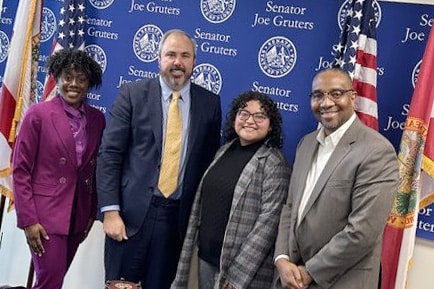
(L-R) Jailynn Youmas (University of South Florida), Fl. Sen. Joe Gruters, Giselle Galvan (Florida Atlantic University), and Thomas Williams (PLANit Sarasota Director).
By noon, the advocacy fellows dispersed into small groups of five with their mentors to meet with legislators and to share the stories they’ve carefully prepared in the weeks leading up to their visit.
“Is everyone ready?,” asked Katherine Leiva, a fellowship mentor from Graduate Miami Dade, one of 5 local college access networks. Leiva addressed her group of three college students: Sheila Cuba, a sophomore student from Hillsborough Community College, Isaac Washington, a junior at the University of South Florida (USF), and Ismaray Govea, a freshman at Florida International University, who nervously awaited their first meeting with Bethany Keime, Representative Rizo’s legislative aide. The fellows smiled at each other with excitement.
Once the team was seated inside the office, each student pulled from their personal experiences to advocate for increased access to the Free Application for Federal Student Aid (FAFSA). Each one spoke succinctly before passing the storytelling baton to each other.
Leiva’s team wants Florida’s legislators to implement a “universal” FAFSA policy, which helps unlock aid for students attending a variety of postsecondary institutions, including technical colleges and career programs. Their vision is to help put Florida on track to lead the nation in financial aid accessibility with a statewide policy that makes the financial aid form a requirement for graduation with an opt-out option.
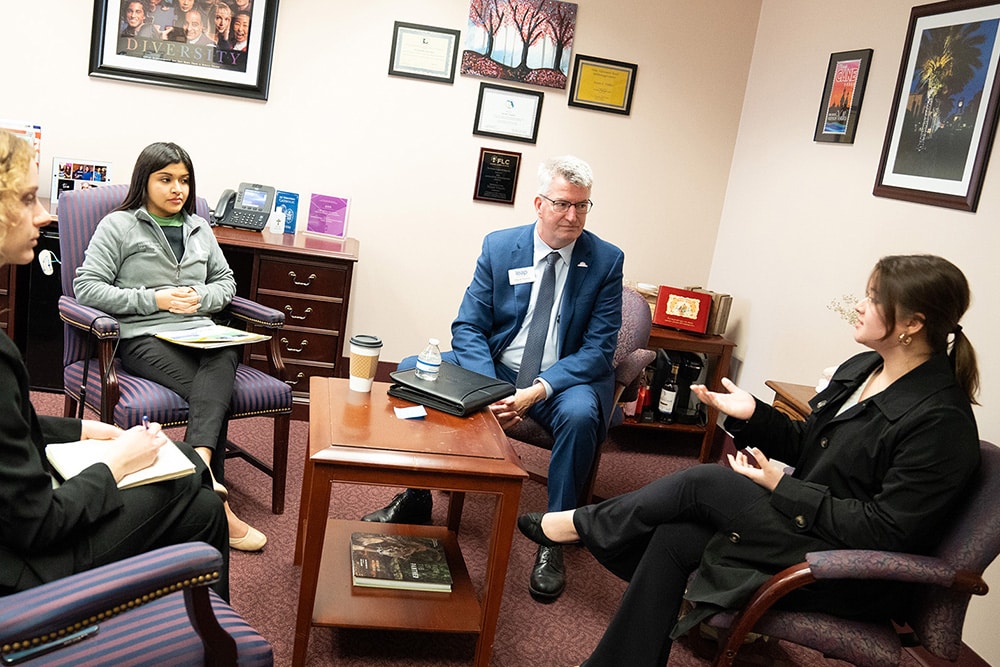
Arisa Nakamichi (Embry Riddle Aeronautical University) speaks to a legislative aide during her meeting in Tallahassee.
One by one, they listed the challenges they faced when applying for FAFSA. Despite taking a financial literacy course, Govea never learned about FAFSA as an option to fund her college education. Cuba struggled to complete the form on her own, which led to errors and subsequential underfunding, which forced her to get a student loan. Washington would find himself sharing basic information about applying for FAFSA to his rural community of basketball peers. “I believe if a Universal FAFSA was mandated it would help achieve even the Governor’s initiative of Sail to 60, resulting in more educated and more career-ready Floridians,” Washington said.
In 2019, the Governor signed House Bill 7071 into law that created the SAIL to 60 Initiative (SAIL stands for “Strengthening Alignment between Industry and Learning”), which set a state goal to increase the percentage of Florida adults holding high-value postsecondary degrees, certificates, or training experiences to 60% by 2030.
National data shows 90% of students who complete the FAFSA enroll in postsecondary education directly from high school, compared to just 55% of non-completers.
Every year, Florida’s high school graduating class misses out on over $300 million in Pell Grants. Recent changes to the form, which simplified the questions and expanded the maximum Pell Grant program, sets Florida on a path to receive over 800 million dollars more for students in need, according to the U. S. Department of Education.
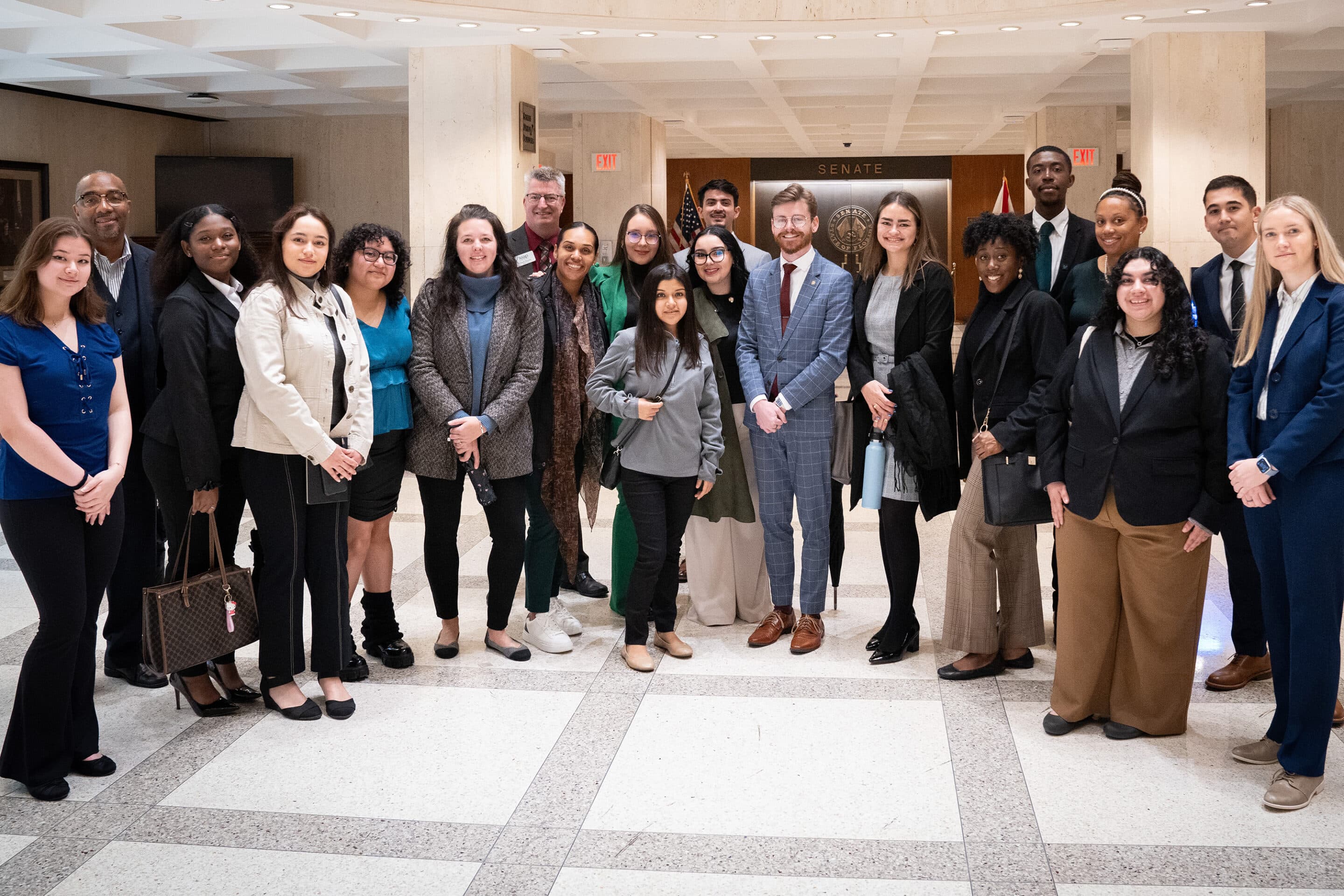
FCAN’s 2023-24 Student Advocacy Fellows participated in two days of advocacy at Florida’s State Capitol on Jan. 16 and 17 to focus on key education policy issues such as adopting a universal FAFSA, expanding emergency and need-based aid to students facing economic barriers, and increasing awareness of career and technical pathways so that students can have continuous options for attaining credentials and degrees.
FCAN’s Advocacy Agenda: Since 2015, FCAN and their statewide partners sponsored initiatives such as the Florida FAFSA Challenge (one of four College Ready Florida statewide initiatives) to increase awareness, support and accessibility of education-related resources and pathways.
- Universal FAFSA to increase postsecondary attainment of high-quality degrees or credentials
- Increased awareness of career and technical transfer pathways
- Increased emergency and need-based aid for students who face cost-of-attendance challenges
The Advocacy Fellowship program began in 2021 to help elevate student’s voices and experiences. “It’s really impactful to have students in the room that personify the effects that a policy like this could have if implemented,” said Deborah Martin, FCAN’s policy analyst and the program coordinator.
Since last fall, the 2023-24 advocacy fellows met periodically with their mentors to hone their skills in policy analysis, navigating state legislation, and public speaking.
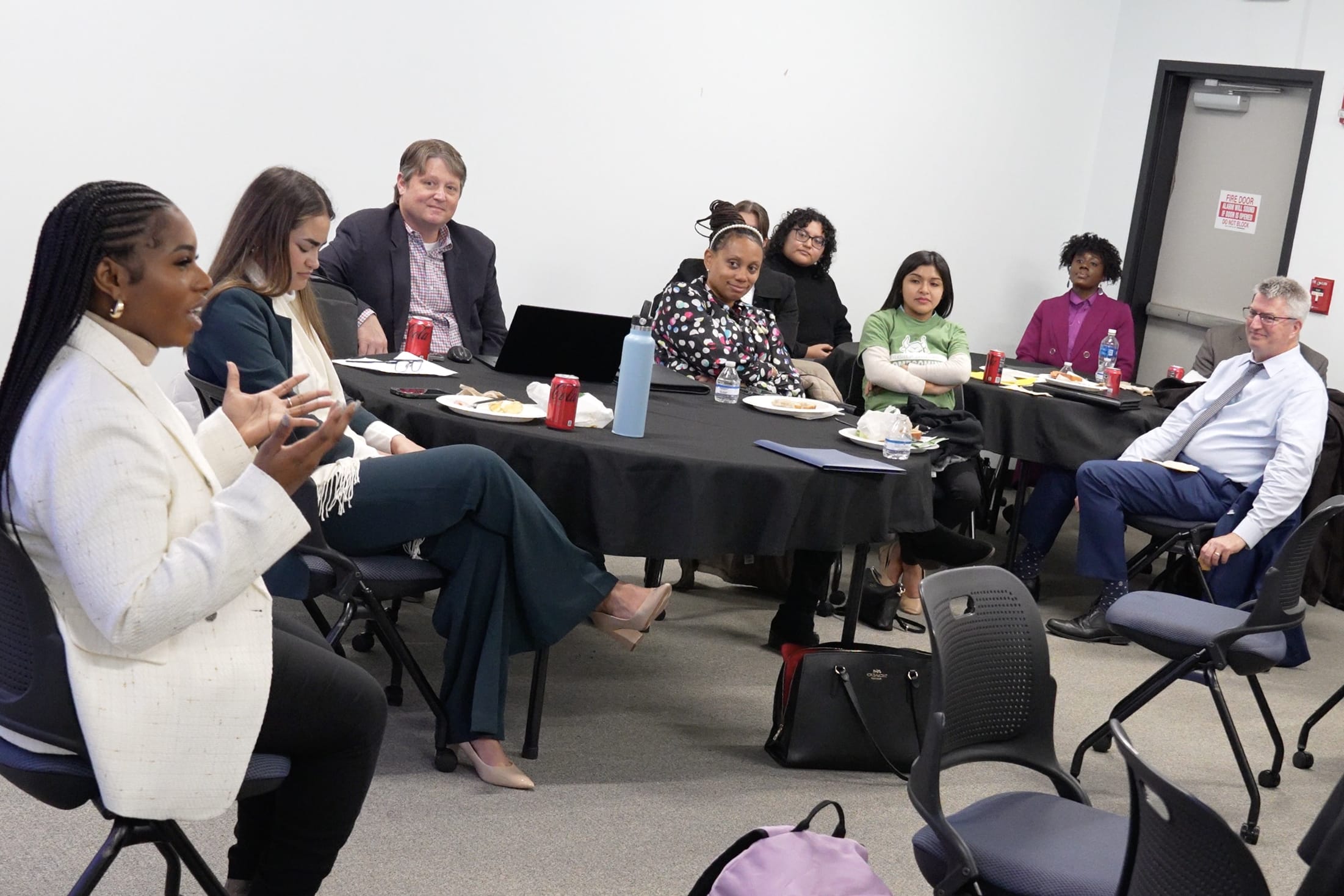
Zenani Johnson, of the Florida Chamber of Commerce, presented to the 2023-24 FCAN Advocacy Fellows.
Guest speakers visited this year’s cohort to help them learn more about the different ways that advocacy, research, and policy is used in the government process. Zenani Johnson, the Equality of Opportunity Coordinator for the Florida Chamber of Commerce, was a guest speaker and former student in FCAN’s first cohort of advocacy fellows.
“Speaking to this year’s cohort felt like a full circle moment,” Johnson said. “The fellowship experience not only enhanced my skillset as an advocate for my peers and community, but also provided me with invaluable relationships and knowledge that continue to benefit me in my current role.”
In addition, the student’s received on-going mentorship from their mentors to help them match education policy with their student experiences to drive a cohesive advocacy-oriented meeting.
By the second day of the visit, the fellows confidently weaved around dozens of staff and visitors, packed into elevators and the hallways, navigating independently throughout the main building’s 22-stories, and leading conversations inside the offices of legislators.
Student fellows expanded the issue of affordability to other agenda items, such as increasing emergency and need-based aid for students facing cost-of-attendance challenges, which threatens completion rates.
“It could be anything from cash allowances, vouchers, gift cards, food banks, food items, household items,” explained Rayatah Omawale, sophomore at Valencia College. After experiencing some health problems, Omawale turned to her college for resources that helped her stay in school. “I was shocked to learn that it wasn’t just me that needed that help, and that other people needed those resources.”
As each meeting ended and another began, students throughout the capitol reveled at the experience of talking to representatives and using their stories to connect with legislators about education policy.
“Civil engagement is super important,” said Abigail Koester, a sophomore at the University of Florida. “This process definitely makes you more comfortable and more confident walking into those conversations.”
The two-day advocacy event was transformative for the fellows. Many started the program not knowing anything about politics or how their careers could intersect with state policy. They left with deep understanding of how their lives are impacted by their representatives, reaffirming their selves as leaders.
“Everyone has different careers they want to pursue, and so they might not all be advocacy-focused, but I think making sure when we leave Tallahassee they can still be an advocate for issues that they care about,” said Martin.
|
INSIGHTS FROM THE 2023-24 ADVOCACY FELLOWS: “At first it was challenging,” said Diana Garcia, a junior at USF. “My mentor made it very simple, and he helped a lot throughout the way. So, I felt very prepared when I got here.” Garcia benefitted greatly from her mentorship with Chuck Tiernan, LEAP Tampa Bay’s director. “For someone who’s a first-generation college student or even a first-generation high school graduate and has no idea where to start, where to go, they’re just like– oh, okay, well, there’s nothing out there for me,” shared Garcia. Several of the fellows identified with the struggles of navigating postsecondary education as a first-generation student, which requires a trailblazing spirit. “A key motivator for me has always been my younger sister,” said Giselle Galvan, a sophomore at Florida Atlantic University. Galvan learned about the fellowship through a connection at Path to College, an organization that helps high school students attend college debt free. “I believe that FAFSA should be a graduation requirement with an option to opt out. So, one– students can know about the form and how to complete it, two– have school counselors or other school members help them, three– allow students to have knowledge of the resources so they don’t resort to federal loans or private loans, which they can get into serious debt later on in their academic life.” Brandon Agcaoili, an Air Force veteran and junior at the USF, was surprised to learn FAFSA would pay his tuition. “There was nothing in play to educate myself and my peers that FAFSA was even a thing, so I just never filled it out. So now that I’m advocating for it, maybe I can get our message to new up and coming students who are looking for funding to go to school,” Agcaoili said. Collectively, the fellows’ voices pointed to disparities, highlighting the importance of equitable educational attainment. “Oftentimes we feel as though our words aren’t enough,” said Jailynn Youmas, a USF graduate. “But today has truly shown me that they are more than enough,” Youmas added. Led by PlanIt Sarasota’s director Thomas Williams, Youmas watched Representative Fiona McFarland take immediate action. “I sat across a representative and watched her text someone about the advocacy agenda that I brought forth to her on behalf of Florida College Access Network. Your words have power,” Youmas shared delightfully. |
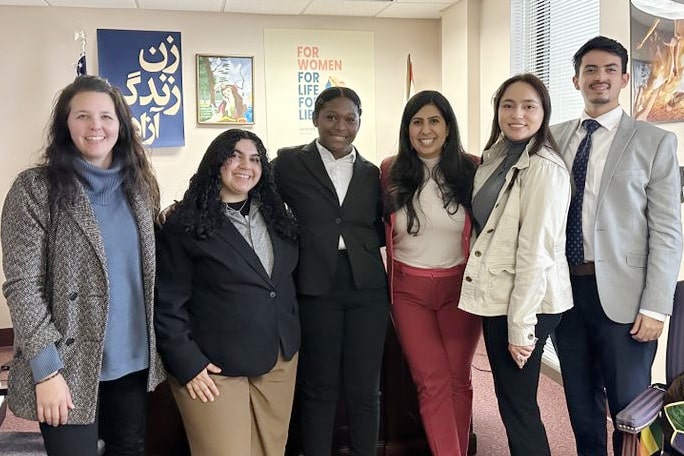
(L-R) Morgan Evers (ASPIRE Capital Region), Jahnee Smith (Florida International University), Rayatah Omawale (Valencia College), House Representative Anna V. Eskamani is an American politician who is the member of the Florida House (42nd district), Vanessa Jimenez (Florida Atlantic University), Andres Felipe Gil Arana (Florida State University).
Mentors: Chuck Tiernan, LEAP Tampa Bay; Thomas Williams, Planit Sarasota; Katherine Leiva, Graduate Miami Dade; Morgan Evers, ASPIRE Capital Region; Colleen Lockwood and James Knapp, Broward B2L (which James Knapp went in her place to Tallahassee but she guided the fellows throughout the entire learning process)
Guest Speakers: Chris Sanchez, Policy Chief for the House Education Quality Subcommittee; Wendy Dodge, Lobbyist at the Southern Group; Ally Liby Schoonover, Senior Policy Advisor at Metz, Husband, and Daughton; Dr. Altony Lee, Associate Vice Chancellor of Public Affairs at the Board of Governors; Zenani Johnson, Equality of Opportunity Coordinator at the Florida Chamber Foundation (and 21-22 FCAN advocacy fellow!); Milan Thompson, Assistant Director of Governmental Relations at FAMU.

